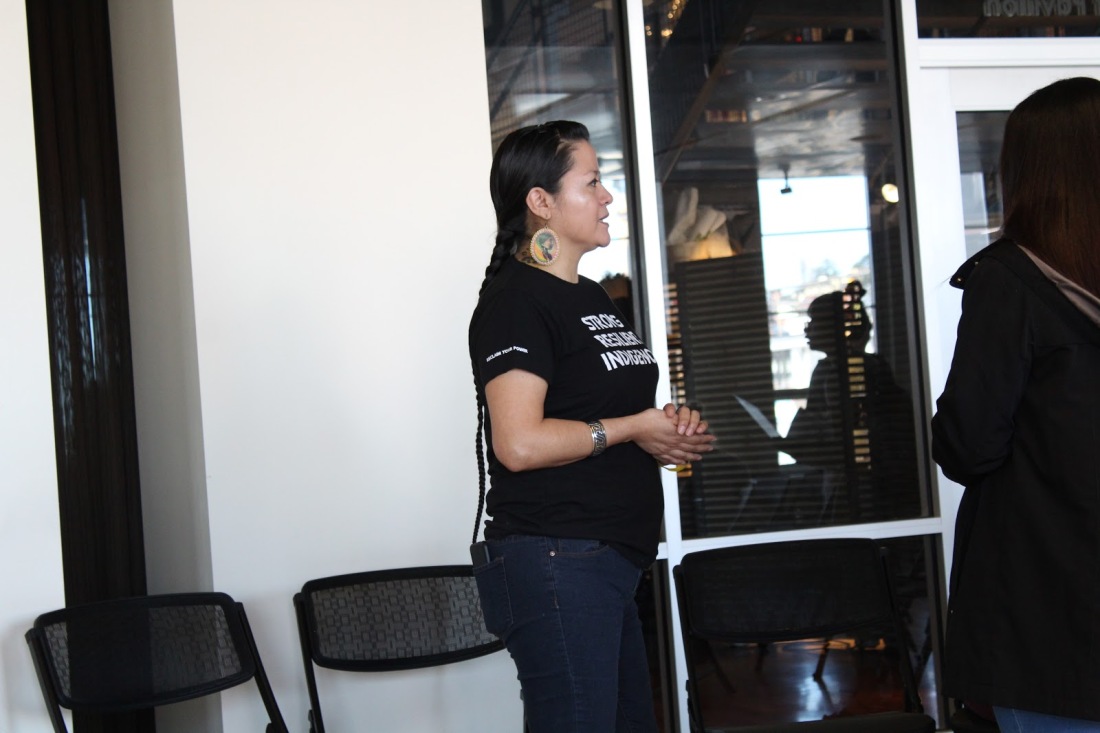Group Members:
Kinsey Eager – Interviewer
Liam Pronovost – Photo Editor, Category Editor
Alexis Griggsby – Photographer, Metadata Editor
Tyler Sphar – Live Blogger
Michael Hinman – Quality Editor
Why we selected these photos: Liam Pronovost
The photos below capture the feeling and community of the WWR (un)conference. From interviews with artists to the many archives in the Women Who Rock website, what makes this conference so special is the community it brings. The photos below give examples of artists talking with each other, and people whom they have inspired. The women in these photos are artist who worked toward their goals, and are still continue to inspire young artists. By working together on this project we learned how to work hard toward a common goal, communicate effectively through technology and in person, and solve complex problems while relying on each other for support. The presence of specified jobs and steps to complete helped facilitate the timely completion of the project and keep confusion to a minimum.
Photos taken by: Alexis Griggsby
Women Who Rock (Un)Conference Photography (Alexis Griggsby)

Pictured: Black Mama, Ixtlixochitl Salinas -Whitehawk, Kibibi Monie
Category: Write to Rock
Black Mama is a female artist who isn’t afraid to sing about her culture and story. She is an inspiring artist and hard worker.

Pictured: Kibibi Monie
Category: Reel Rebels.
Kibibi Monie leads the way in storytelling, art, and music going against social norms and working toward her goals.

Category: Making Scenes
Pictured is the WWR Alter. It stands as an example of story of the women who have impacted rock in numerous ways. This archive gives them the attention and acknowledgement that they may have not received due to the culture they were in.

Pictured: Ixtlixochitl Salinas -Whitehawk
Category: Reel Rebels
Ixtilixochitl is a cultural educator. She was born into an indigenous tribe which sparked her love for art and dance. Her work is ever changing and always inspiring.

Pictured: Black Mama, Ixtilxochitl Salinas- Whitehawk, Kibibi Monie
Category: Building Communities
This represents the WWR (un)conference well. Female artists from different backgrounds and stories coming together to share their experiences and talents.

Pictured: Julie C
Category: Building Community
At the WWR (un)conference, artist are able to share their stories, art, and experience with those around them. Julie C did this wonderfully this weekend.
Women Who Rock (Un)Conference Interviews
3/10/18 — 10:15am-12:30pm
(Kinsey Eager)
Interview 1:
Interviewer: Kinsey Eager
Interviewee: Amber Clark
Date: 3/10/18
KE: Alright, what does this conference mean to you?
AC: I just think that the gathering of communities is really empowering especially since it fell so close to International Women’s Day
KE: It’s really convenient that that happened actually
AC: I know!
KE: I can’t believe that. And then my second question is what is the most significant thing to you about this day and this conference?
AC: I just‒ I think the fact that women are all coming together to celebrate each other is so important especially for people like me, you know, in their mid twenties, and ready to make a difference in the world and in a position to do that, you know?
KE: Totally, totally! Yeah and I’m in college right now too so it’s like really‒ college is such a big place for that and women empowerment so, thank you so much for talking to me!
AC: Yeah, thank you!
Interview 2:
Interviewer: Kinsey Eager
Interviewee: Roshanak Kheshti
Date: 3/10/18
KE: Alright so what does this conference mean to you, like why are you here?
RK: I actually was invited by Michelle to come to participate in the longer version. I’m a professor at the University of California San Diego.
KE: Oh cool, wow! So you came all the way up here from California?
RK: Yeah!
KE: Do they come down, like do they have a similar conference down there too?
RK: No, we don’t! This is pretty unique, there’s really nothing else like it.
KE: Yeah that’s really amazing. This is my first time being here so it’s really cool.
RK: It’s a very special thing you have here.
KE: Oh yeah, for sure. And then also, what is the most significant thing to you about this day and about this conference? Like what’s the most important to you about it?
RK: You know, the fact that there’s so many people from the community coming together with artists and using incredible resources like this that the city has. That is not very typical for an academic to experience. You know, I don’t really ever see stuff like this coming together, so that’s definitely very unique.
KE: Yeah and like I said this is my first time I’ve ever been to a conference like this, and it’s really actually been very cool so far like listening to the panels and stuff like that, it was actually really amazing.
RK: What’s your major?
KE: I’m going Nursing or Psychology, either one.
RK: Oh okay.
KE: Yeah, so this is more of an experience, diversity class I’m taking.
RK: Oh I see, I see. What’s this class called?
KE: It’s a “Music and Social Change” class but it’s mixed with a Gender, Women’s Sexuality Studies class.
RK: Oh very interesting.
KE: Yeah! Well thank you so much for taking the time to talk to me.
RK: Sure, sure! Good luck!
KE: Thank you!
Links to Live Blog posts (Tyler):